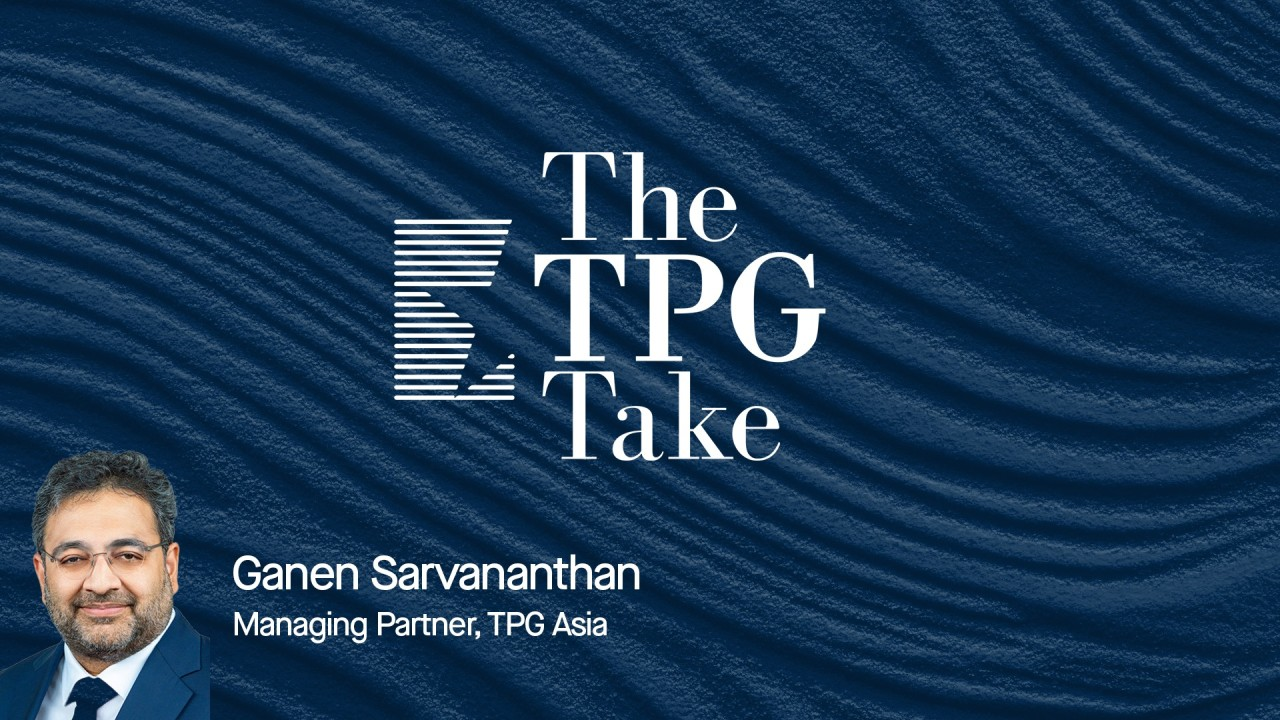
November 2024, Issue #7
Asia and the Middle East in Focus: Investment Perspectives from TPG Asia Managing Partner Ganen Sarvananthan
In our latest edition of The TPG Take, we sit down with TPG Asia Managing Partner Ganen Sarvananthan who discusses the macro trends and growth drivers across Asia and the Middle East, and what this means for private markets. Ganen also shares his perspectives on the healthcare sector in Asia and how managers can differentiate themselves in this heterogenous region.
Macroeconomic Trends in Asia
"I think what's really interesting about Asia is that it's going to be the most important contributor to the world economy by 2030. Three out of the top five GDP countries in the world are expected to come from Asia. You are seeing explosive growth in India, as well as countries like Indonesia. These are some of the most populous countries in the world, and Asia is at that point now where the per capita incomes in these countries are beginning to be such that consumption and things like private healthcare are going to be really important sectors for their growth, and these are sectors that TPG excels in."
Sector Spotlight: Healthcare in Asia
"Going back to 2004, the sector that has excited me the most has been healthcare. The public healthcare system in Asia will not be able to cope with the needs and demands of the middle class that is being created, and therein lies a big opportunity for private capital to go in – whether that's in private equity, growth equity, private debt, or real estate.
It's interesting that certain parts of Asia are stuck in what you would call an aging profile, with Japan being pretty significant and China heading there. But at the same time, you have a growing younger population in some countries like Indonesia and India, and the stark contrast between these two groups of countries is going to define Asia in the future.
There's a lot of private healthcare spend that's going to occur as populations age, and so that's been a way to focus some of our healthcare services investments that we are doing in the region."
Opportunities in the Middle East
"When we talk about the Middle East, it's a very large and complex region. Our focus right now is in the Gulf countries, which all have a certain commonality. They all have a high purchasing power per capita, most are resource-rich in oil or gas, and they have smaller populations with high spend. They're also massive travel hubs – Dubai, Doha, Abu Dhabi, increasingly Riyadh as well – looking to try and establish themselves as places that connect East and West.
It's an exciting region. They've opened themselves up in many different ways, and there's a great source of capital to invest outside. They're going to be important buyers of companies for us, whether that's out of our TPG Capital business in the U.S., our TPG Growth business, but also in TPG Asia where they're increasingly looking East and looking towards building connectivity and relationships out in Asia.
We've decided to look at the Middle East through the lens of Asia because there's a lot of similarities with it: there are families, there are royal families, and there are sovereign funds. A number of those exist in Asia too, and so there's a lot of cultural connectivity between the two regions and we're looking to try and benefit from that.
I think TPG is pretty unique in terms of its roots out of a family office. I think those roots have long appealed to families in Asia and may equally so appeal to families in the Middle East."
TPG’s Investment Approach in Asia
"TPG Asia is one of the oldest firms in the region, having been around for 30 years. I think our decision to go towards having a true partnership is a critical part of our success. We all come from different geographies, different markets, different per capita incomes, and we need to respect the diversity of the markets that we operate in. Having said that, I think where we converge is in our style of investing. We're after companies in our core sectors that have a growth hydraulic behind them. So the style of investing is what brings us together while still celebrating the diversity of the countries that we're in.
I think portfolio companies look for sector expertise and track record capability, but at the end of the day, one of the most important key strengths is that people want to do business with people they like. And I think the culture at TPG that encourages people to be more understated and to lead with your capabilities versus too much bravado, is a really important thing to do well in a market like Asia.
I think in the next five to ten years, the biggest opportunities in Asia are to have these homegrown Pan-Asian businesses. There are going to be so many of these global companies that have come out of the U.S. and Europe and, in some cases, selectively out of Japan. I think you're going to see some of those come out in other countries in Asia and that's what's going to be really exciting."
In Other News & Views...
As usual, we also want to "circle back" to share other recent insights from our ecosystem, senior leaders, and investing professionals that you might have missed.
In our series Partnerships in Focus, we hear directly from leaders across the TPG portfolio and ecosystem. In a recent episode, we hear from the CEO of PS Amina Belouizdad Porter and TPG Business Unit Partner BJ Loessberg on transforming PS from a security company into a first-of-its-kind luxury travel service aiming to revolutionize the way people fly. They discuss our partnership and the successful sale of the business to Groupe ADP.
In our series TPG Rise Climate Conversations, we recently sat down with Scott Lebovitz, Head of Transition Infrastructure (TI), to discuss the team’s sector-focused approach to climate investing and how his infrastructure background helps him identify opportunities fit for TI.
Last month, we had the pleasure of convening many of our clients and colleagues from around the globe for our 31st annual TPG Capital Investors meeting. Leaders from across the firm shared their views on the market and navigating disruption, as well as industry insights and deep dives into some of our most important investment themes, from value-centric care to zero-trust cybersecurity. You can find some highlights below:
Thank you to all of our followers and readers for joining us for another edition of The TPG Take. Please share the newsletter with anyone you think would be interested and we look forward to being back in your inboxes soon.

TPG
345 California St suite 3300, San Francisco, CA 94104, USA
Important Disclosures
This material is solely for informational purposes and shall not constitute an offer to sell or the solicitation to buy securities. The opinions expressed herein represent the current, good faith personal views of the author(s) at the time of publication, and do not necessarily represent the views of TPG, its affiliates, or any of its investment professionals. The opinions expressed herein are not definitive investment advice and should not be relied on as such. The information presented herein has been developed internally and/or obtained from sources believed to be reliable; however, TPG does not guarantee the accuracy or completeness of such information. We provide links to third party websites only as a convenience and the inclusion of such links does not imply any endorsement, approval, investigation, verification or monitoring by us of any content or information contained within or accessible from the linked sites. If you choose to visit the linked sites you do so at your own risk, and you will be subject to such sites' terms of use and privacy policies, over which TPG has no control. In no event will TPG be responsible for any information or content within the linked sites or your use of the linked sites. Predictions, opinions, and other information contained in this material are subject to change continually and without notice of any kind and may no longer be true after the date indicated. Any forward-looking statements speak only as of the date they are made, and TPG assumes no duty to and does not undertake to update forward-looking statements. Forward-looking statements are subject to numerous assumptions, risks and uncertainties, which change over time. Actual results could differ materially from those anticipated in forward-looking statements.
